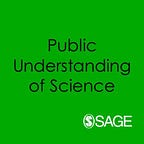On Expertise — cultivating character, goodwill, and practical wisdom
Review by Julia Metag
It is noteworthy that the book gives so much attention to citizen scientists and their assessment of expertise because it underscores how important making a meaningful contribution is as a facet of expertise.
Expertise and experts are crucial to building knowledge and capacities but experts have also become targets of criticism over the past years, amplified during the Covid-19 pandemic. Some commentators have diagnosed a decrease of trust in experts. This book is thus very timely in discussing what expertise is and what constitutes an expert.
In the introduction and the first three chapters, Mehlenbacher introduces her concept of expertise, which is deeply rooted in rhetorical studies. In the last two chapters, she exemplifies the theoretical concept of expertise from interviews with experts in multidisciplinary teams as well as interviews with citizen scientists. Excerpts from the interviews are also interwoven now and then in the first three chapters to back up the author’s reasoning.
Mehlenbacher argues in her introduction that expert status and expertise are both rhetorical in nature and that phronesis as a rhetorical concept is central to understanding expertise. She defines expertise as consisting of three facets: knowing-that (episteme), knowing-how (techne) and knowing-why (phronesis). Phronesis is concerned with practical wisdom, the knowledge of what is ethically good, acceptable and appropriate. This adds another aspect to the conceptualisation of expertise: conceiving expertise as having phronesis means that expertise is socially situated.
In the first chapter, the author embeds expertise as a rhetorical act in theories of virtue ethics. By doing so, she stresses that if expertise requires some kind of phronesis, it requires a social orientation and responsibility. Morality is also important for acting as an expert.
In the same vein, expertise is thought of as relational; the relationship between an expert and her audience is important. Chapter 2 dives deeper into rhetorical studies on science with a specific focus on expertise. Mehlenbacher shows that ethos is central to expertise because it offers an understanding of expertise through phronesis, one of the central elements of ethos. In chapter 3, psychological theories on expertise are drawn on, with a special focus on studies of memory. It relates to how people become experts and what role experience plays in being an expert.
Drawing on the interviews, the theoretical conceptualisations outlined in the first three chapters are then illustrated in a variety of ways and vividly presented. Chapter 4 summarises various aspects of what constitutes an expert through the lens of researchers. This includes how professional researchers define expertise, what role the ability to solve problems plays for being recognised as an expert, how theoretical and practical knowledge intertwine and how researchers assess expertise.
The interviews with experts in multidisciplinary teams make this analysis very interesting since they illuminate definitions of expertise across disciplines. Chapter 5 is devoted to how citizen scientists perceive and assess the above-mentioned aspects of expertise. It is noteworthy that the book gives so much attention to citizen scientists and their assessment of expertise because it underscores how important making a meaningful contribution is as a facet of expertise.
For science communication scholars, this aspect is also particularly interesting in how it relates to studies on public engagement with science. In the conclusion, the author relates to the unfolding events of the Covid-19 pandemic to stress the importance of ethically crafted communication of expertise — not only with regards to Covid-19 but also other major issues such as the climate crisis.
Throughout the book, Mehlenbacher also refers to trust as a central concept because trust in science and expertise also encompasses trust in the fact that expertise is morally grounded. In this way, she touches upon central debates on trust in science and expertise. However, here the book could have included other scholarly literature on trust in science from psychology or communication science to demonstrate even more fully the interdisciplinary value of the author’s conceptualisation of expertise.
The book is very dense in its account of rhetorical concepts. On the one hand, this leads to a theoretically thick line of reasoning but, on the other hand, it is not always easily accessible to those without a background in rhetoric. However, the interweaving of theoretical arguments and quotes from the interviews helps readers from other disciplines to follow the line of argumentation. Overall, the book is a timely account of expertise and expert status, illuminating the concepts from a rhetorical perspective.
Julia Metag is Professor of Communication Science at the University of Münster, Germany. Her recent publications include (as co-editor) the handbooks, Forschungsfeld Hochschulkommunikation (2019) and International Trends in Environmental Communication (2022) and she co-leads the Wissenschaftsbarometer Schweiz (Science Barometer Switzerland).
